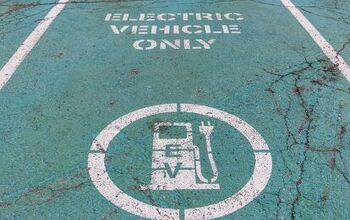Quebec Banning Gasoline Dependent Passenger Vehicles in 2035

On Monday, the Canadian province of Quebec announced it would be joining California and numerous European locales in the banning of gasoline-powered automobiles. Announced during a meeting regarding the region’s green economy plan, the French-speaking province said all new vehicles sold after 2035 would have to be entirely electric. Then there was a slight derailment as Premier François Legault used the occasion to publicly decry that it was “totally unacceptable” that some shop owners in Montreal are failing to greet customers in French and that the situation needed to be remedied immediately. Montreal Mayor Valérie Plante agreed, saying “clients must be able to get served in French. Period.”
One battle at a time, heroes. Justice will be served (and in glorious French) to those English-speaking heathens and their foul-smelling cars soon enough.
From Reuters:
Quebec will also renew the rebates on the purchase or rental of an electric vehicle and charging stations for citizens. Currently, the government offers individuals, businesses, organizations and Quebec municipalities a rebate of up to $6,100 on the purchase or lease of a new electric vehicle.
The government said it will also do its part by electrifying its provincial fleet of light vehicles as much as possible so that by 2030, 100 percent of its cars, vans and SUVs, as well as 25 percent of its pickups, will be electric.
The ban will bring Quebec in line with other jurisdictions such as California, the largest U.S. auto market, which in September announced a move to electric vehicles starting in 2035.
The Canadian province of British Columbia has already moved to phase out fuel-powered cars and trucks over a two-decade period, with a total ban on their sale or lease coming into effect in 2040.
Despite a large number of global leaders promising comprehensive, net-zero emissions plans, we’re dubious as to anybody achieving their environmental goals within the next decade. EV development is progressing more slowly than the industry had originally anticipated and there are real questions as to the sustainability of widespread electrification — especially without a complete and costly overhaul to the supporting infrastructure. We’ve already seen a few of these suggested internal combustion bans get pushed back by five years or more and imagine governments will continue moving the goalpost until circumstances actually allow for carbon neutrality.
It’s wonderful to see so many world leaders thinking about the future so often. But most of us have to live in the real world until it manages to catch up with the dream.
[Image: Jim Barber/Shutterstock]

A staunch consumer advocate tracking industry trends and regulation. Before joining TTAC, Matt spent a decade working for marketing and research firms based in NYC. Clients included several of the world’s largest automakers, global tire brands, and aftermarket part suppliers. Dissatisfied with the corporate world and resentful of having to wear suits everyday, he pivoted to writing about cars. Since then, that man has become an ardent supporter of the right-to-repair movement, been interviewed on the auto industry by national radio broadcasts, driven more rental cars than anyone ever should, participated in amateur rallying events, and received the requisite minimum training as sanctioned by the SCCA. Handy with a wrench, Matt grew up surrounded by Detroit auto workers and managed to get a pizza delivery job before he was legally eligible. He later found himself driving box trucks through Manhattan, guaranteeing future sympathy for actual truckers. He continues to conduct research pertaining to the automotive sector as an independent contractor and has since moved back to his native Michigan, closer to where the cars are born. A contrarian, Matt claims to prefer understeer — stating that front and all-wheel drive vehicles cater best to his driving style.
More by Matt Posky
Latest Car Reviews
Read moreLatest Product Reviews
Read moreRecent Comments
- Wjtinfwb My comment about "missing the mark" was directed at, of the mentioned cars, none created huge demand or excitement once they were introduced. All three had some cool aspects; Thunderbird was pretty good exterior, let down by the Lincoln LS dash and the fairly weak 3.9L V8 at launch. The Prowler was super cool and unique, only the little nerf bumpers spoiled the exterior and of course the V6 was a huge letdown. SSR had the beans, but in my opinion was spoiled by the tonneau cover over the bed. Remove the cover, finish the bed with some teak or walnut and I think it could have been more appealing. All three were targeting a very small market (expensive 2-seaters without a prestige badge) which probably contributed. The PT Cruiser succeeded in this space by being both more practical and cheap. Of the three, I'd still like to have a Thunderbird in my garage in a classic color like the silver/green metallic offered in the later years.
- D Screw Tesla. There are millions of affordable EVs already in use and widely available. Commonly seen in Peachtree City, GA, and The Villages, FL, they are cheap, convenient, and fun. We just need more municipalities to accept them. If they'll allow AVs on the road, why not golf cars?
- ChristianWimmer Best-looking current BMW in my opinion.
- Analoggrotto Looks like a cheap Hyundai.
- Honda1 It really does not matter. The way bidenomics is going nobody will be able to afford shyt.


































Comments
Join the conversation
I don't plan on buying an EV in the near future but who knows if I am still driving and looking for a new car in 2035 or 2040 I might buy one if the price is competitive and the battery technology and infrastructure improves which it most likely will. If I bought an EV it would be less as a statement and more because I like it and it better meets my needs. A government mandate is not going to force me to buy something but competitive prices and improved technology and reliability would be a more important factor in my deciding to buy an EV.
@fleecy--True but the manufacturers are going to make the vehicles that sell. If few buy an EV then the manufacturer has little incentive to make them. I am not saying that EVs won't sell but the manufacturer is going to make the types of vehicles that are selling well. For example if the Government wanted most us us to buy compact and subcompact cars but most of us buy full size pickups or suvs then the manufacturer has little incentive to make compact and subcompact cars. I would likely buy an EV in the future if the price drops and the battery technology improves along with improve infrastructure. I doubt I would ever buy a Tesla but an EV competitively priced that can be serviced at most places would be a vehicle I would consider. Also affordable and readily available replacement parts for any parts that might wear out.